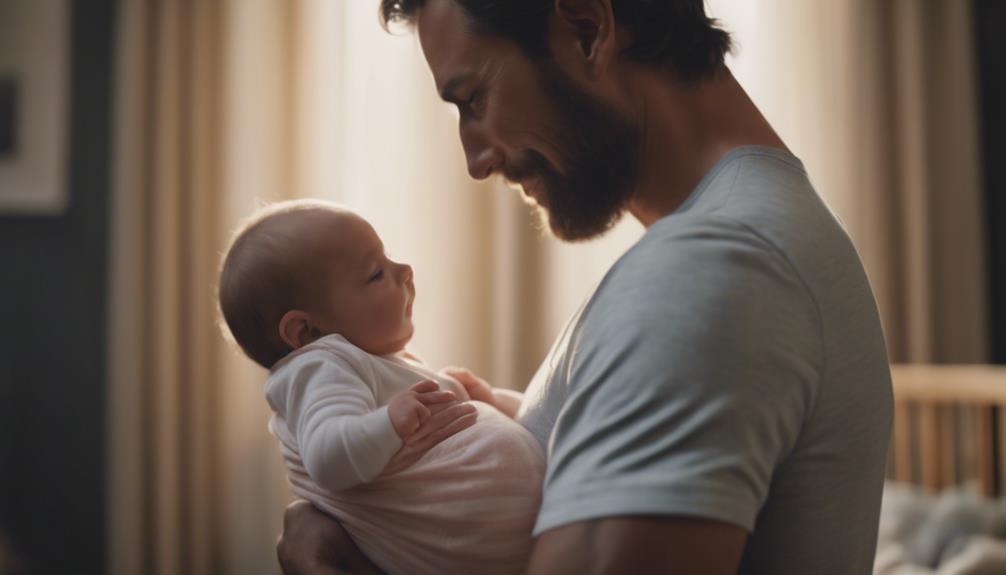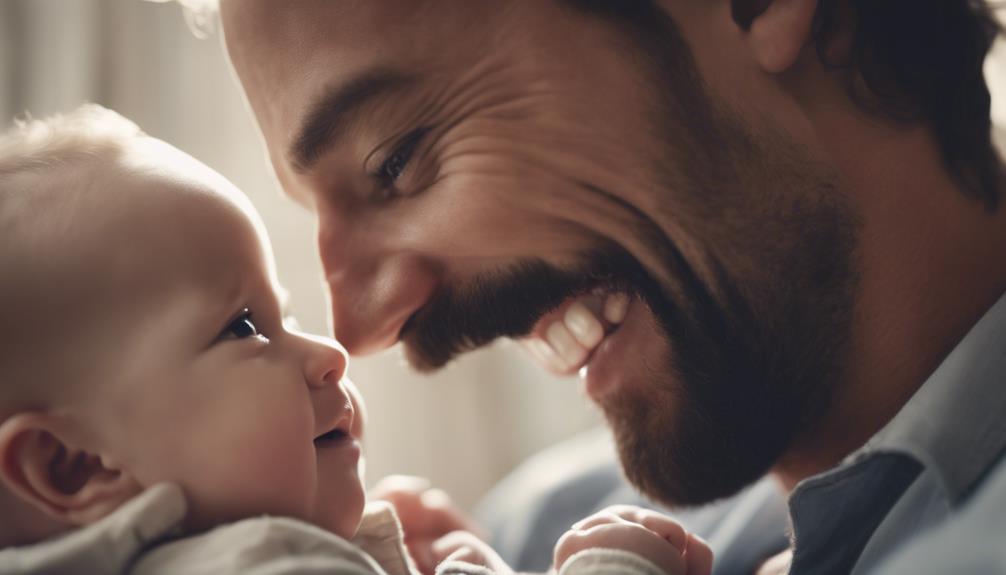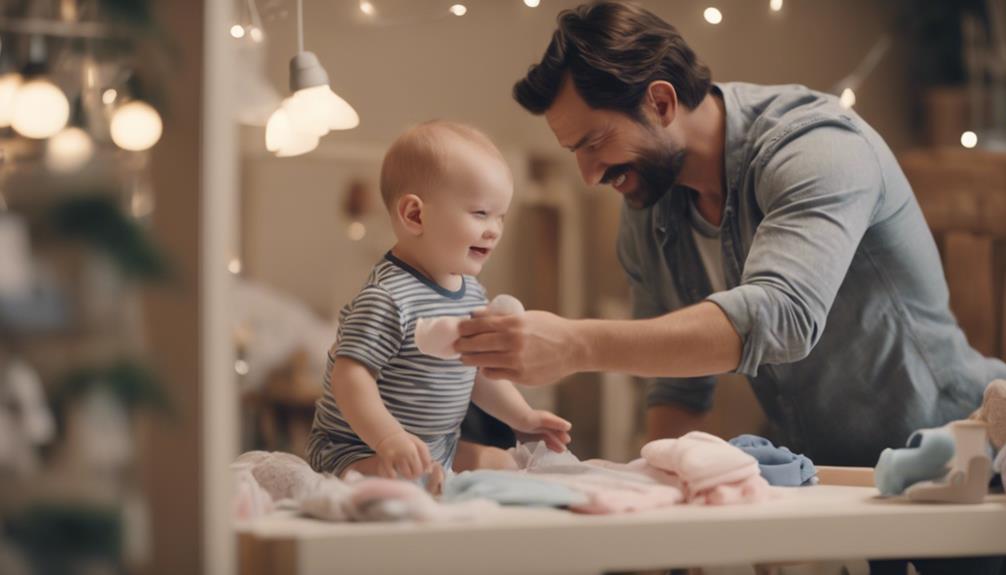To determine if he is prepared for starting a family, pay attention to indicators such as financial readiness, open communication, a desire for children, emotional preparedness, and a strong foundation in the relationship. Keep an eye out for responsible saving habits for child-related expenses, honest discussions about family plans and goals, enthusiasm about becoming a parent, nurturing tendencies, and supportive emotions. Look for a commitment to planning for the future, prioritization of family life, making joint decisions regarding family objectives, stable property ownership, and expressing a wish to settle down. If these signs line up, you might discover a clear path toward parenthood unfolding.
Key Takeaways
- Discussing future family plans openly and enthusiastically.
- Showing financial readiness and responsibility for childcare.
- Expressing a strong desire for children and family life.
- Aligning on parenting roles, styles, and aspirations.
- Prioritizing shared family goals and commitments.
Financial Preparedness
If your partner is showing signs he wants a baby with you, one clear indication is his focus on saving money for future childcare expenses. Financial preparedness is an essential aspect when it comes to starting a family.
By actively saving money and acknowledging the financial responsibilities and commitments of having a baby, your partner demonstrates a readiness to provide for a family and guarantee financial stability. This focus on financial preparedness indicates a willingness to handle the potential financial strain associated with raising children.
Planning for childcare expenses and being proactive in securing the necessary resources show a level of commitment towards the future. It's essential to have open discussions about financial stability and readiness to make sure that both partners are on the same page when it comes to handling the financial responsibilities that come with starting a family.
Open Communication

Engage in honest and open conversations about your desires for starting a family to promote mutual understanding and readiness. When a man wants to create a family, open communication is essential. Discussing family planning, emotional readiness, and financial considerations is important.
Expressing thoughts on child-rearing practices and engaging in conversations about raising kids signify a desire for a baby. By sharing feelings, concerns, and aspirations for starting a family, both partners can gauge their readiness for parenthood.
Transparency about financial considerations and the willingness to handle the costs of having a baby demonstrate a serious commitment to starting a family. Through open communication, both individuals can align their expectations, discuss parenting roles, responsibilities, and future goals, ensuring they're on the same page when it comes to their desire for a baby.
Openly expressing thoughts and concerns lays the groundwork for a strong foundation as you start this exciting journey of starting a family together.
Desire for Children

Expressing a strong desire for children is a clear sign that he wants to start a family with you. When a man openly discusses his wish to have kids and talks about future parenting roles with excitement, it indicates a genuine interest in building a family together. Conversations about potential baby names, parenting styles, and family activities show his commitment to the idea of parenting. Additionally, his interest in interacting with children and displaying nurturing qualities further solidifies his desire to become a parent.
Moreover, when a man expresses admiration for kids, demonstrates a soft spot for babies, and envisions a future with a family, it reveals his deep-seated desire to have children with you. These signs collectively indicate that he's not only thinking about starting a family but also actively considering you as a partner in this journey of parenthood.
Paying attention to these cues can help you understand his genuine desire to have children and build a family together.
Emotional Readiness

To assess emotional readiness for parenthood, consider if you and your partner share future desires, openly communicate about children, and show a willingness to sacrifice for the family's well-being.
These key points indicate a strong foundation for handling the emotional challenges of having a baby together.
Emotional preparedness plays a pivotal role in building a supportive and nurturing environment for future parenting endeavors.
Shared Future Desires
Discussing shared future desires, such as having children, reveals emotional readiness for initiating the journey of starting a family together. When partners express their future desires, discuss parenting styles, and envision a family life, it signifies a strong emotional readiness for parenthood.
Shared values, goals, and aspirations for family living are essential indicators of being prepared for the challenges and joys of starting a family. Open communication about children and family plans shows a willingness to engage in the emotional aspects of family life.
Emotional support, empathy, and understanding towards each other further demonstrate readiness for the emotional demands of parenthood. By aligning on future goals, values, and parenting styles, partners lay the foundation for a strong family unit.
This emotional preparedness is vital for initiating the rewarding journey of creating and nurturing a family together.
Open Communication About Children
Engaging in open, honest conversations about future children is a key indicator of emotional readiness for starting a family. When you and your partner openly communicate about your desires for children, discuss parenting roles, and share family values, it demonstrates a readiness for baby planning.
Expressing your thoughts on creating a nurturing environment, discussing parenting expectations, and envisioning a family life together all point towards emotional readiness for parenthood. By talking about the number of children desired, naming preferences, and educational aspirations, you show that you're prepared for the responsibilities of raising a family.
Sharing your excitement about family milestones and being transparent about your dreams of having children are vital signs of readiness for the journey of parenthood. Remember, open communication about children isn't just about words but also about aligning your mutual vision for the future and creating a solid foundation for your family.
Willingness to Sacrifice
When considering starting a family, one significant indicator of emotional readiness is your willingness to sacrifice personal desires for the well-being of your partner and potential future children. Parenthood requires empathy, understanding, and a selfless attitude towards prioritizing family needs over individual wants. A key aspect of emotional readiness for having a baby involves making decisions that benefit the future family unit, even if it means making personal sacrifices. Being prepared to support, nurture, and compromise for the happiness of your family showcases a readiness for parenthood.
| Emotional Readiness Indicators |
|---|
| Sacrifice personal desires for family well-being |
| Prioritize family needs over individual wants |
| Make decisions for the future family unit |
| Demonstrate empathy and understanding |
| Show a selfless and caring attitude |
Understanding the importance of personal sacrifices and being willing to put the needs of your family first are essential aspects of emotional readiness for undertaking the journey of parenthood.
Relationship Foundation

To determine if your partner wants a baby with you, evaluate your relationship foundation. Consider if you both share a commitment to the future and have aligned family goals.
Open communication about children is vital in determining readiness for parenthood.
Commitment to Future
Demonstrating a strong commitment to building a future together lays a solid foundation for considering starting a family. When evaluating if your partner is ready for parenthood, pay attention to the following signs:
- Expressing intentions for a future together and discussing family planning indicate a desire for a baby.
- Prioritizing family life and showing a willingness to take on the responsibilities of parenthood signal readiness for having children.
- Showing readiness to navigate parenthood together demonstrates a shared commitment to family.
- Indicating a willingness to prioritize family life over personal pursuits shows a focus on building a family unit.
- Communicating openly about future plans and expressing a desire for emotional connection and stability in the relationship are key indicators of readiness for starting a family.
These signs collectively show that your partner is invested in a long-term relationship and is emotionally prepared for the journey of parenthood.
Shared Family Goals
Creating shared family goals with your partner forms a strong foundation for your relationship. When you and your partner reach a mutual agreement on family planning, parenting styles, aligning values, and aspirations for the future, it signifies readiness for the journey of parenthood.
Discussing long-term goals and openly communicating about shared responsibilities and commitments towards family planning are vital steps in determining if both of you're prepared for the responsibilities that come with starting a family. Shared family goals not only indicate a desire for a baby but also show a deep level of understanding and cooperation between partners.
Open Communication About Children
Engage in open and honest conversations with your partner about children to strengthen the foundation of your relationship. When discussing children with your significant other, consider the following:
- Parenting Styles: Share your thoughts on how you envision raising children and discuss any differences in parenting approaches.
- Family Planning: Talk about your desires regarding the number of children you want to have and the spacing between them.
- Readiness for Parenthood: Express your feelings about becoming parents and discuss any concerns or fears you may have.
- Family Goals: Explore your shared goals for the future and how children fit into your long-term plans.
- Future Family Dynamics: Discuss how adding children to your family might impact your relationship dynamics and daily life.
Family Planning Commitment

Show your readiness for family planning by establishing ownership of property like a house and a car. This signifies stability and commitment in your relationship, indicating a sign that you're ready to create a family.
Expressing a desire for a quiet lifestyle and settling down further solidifies your intentions for having a baby. Marriage proposals and a commitment to spending your life together also demonstrate readiness for starting a family.
Financial stability is vital for family planning, as responsible money management guarantees a secure future for your potential child. Open communication about the future, including discussions about your desire for children, is key in showing your preparedness for parenthood.
Frequently Asked Questions
How Do You Tell He Wants to Get You Pregnant?
You can tell he wants to get you pregnant if he openly discusses family planning, shows interest in kids, displays financial preparedness, talks about parenting styles and future activities with children, and shares a vision for the future.
How Do Guys Feel When Their Girlfriend Is Pregnant?
When their girlfriend is pregnant, guys may experience a whirlwind of emotions – excitement, fear, and joy all bundled into one. It's a journey of self-discovery and growth, where love and support play essential roles in embracing fatherhood.
Do Guys Get Baby Fever?
Yes, guys can definitely get baby fever! It's not uncommon for men to feel a strong desire to have a baby, triggered by various factors. When experiencing baby fever, men may exhibit signs of readiness for parenthood.
Can a Man Tell if a Woman Is Pregnant?
You can't read pregnancy like a book cover; men can't detect it by just looking. Missed periods, nausea, and fatigue may hint at it. For surety, a healthcare pro and a pee stick are your best bets.
Conclusion
To sum up, when it comes to determining if your partner wants a baby with you, pay attention to their financial preparedness, open communication, desire for children, emotional readiness, relationship foundation, and commitment to family planning.
Remember, actions speak louder than words, so keep an eye out for these signs to gauge their intentions accurately.
As the saying goes, 'actions speak louder than words,' so trust your instincts and look for these key indicators in your relationship.









